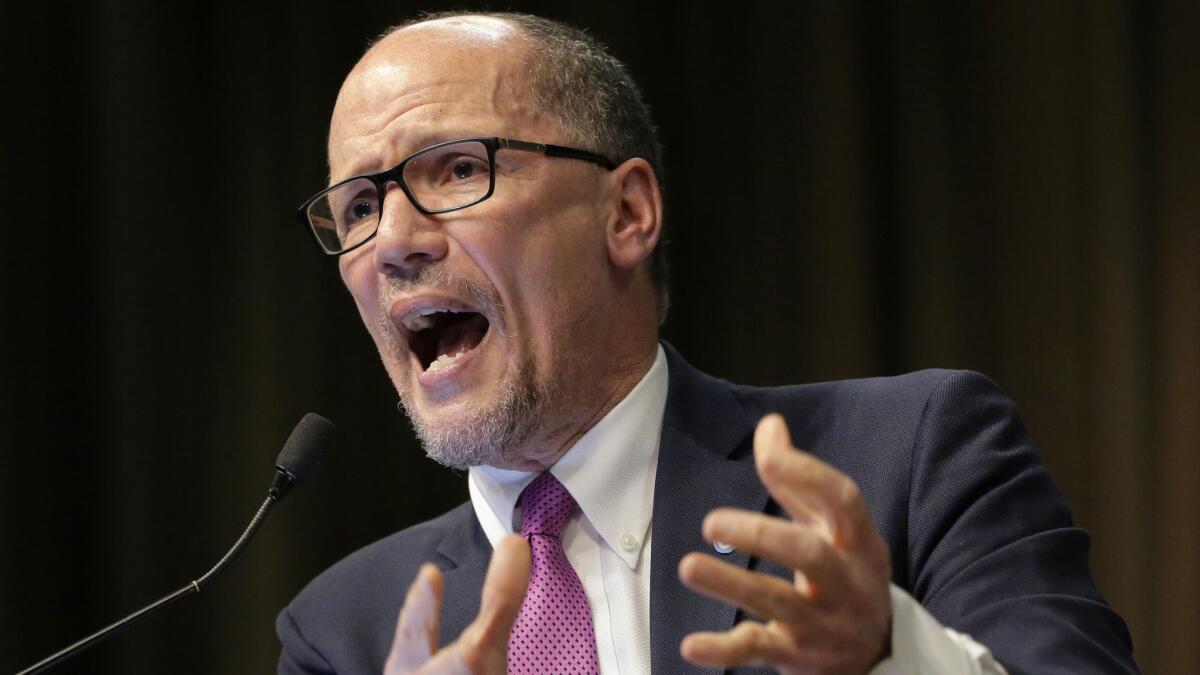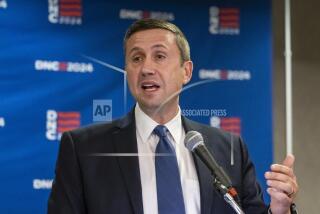As first debate nears, Democratic National Committee is still wrestling with demons of 2016

- Share via
Reporting from washington — Struggling presidential hopefuls won’t be the only ones looking for redemption as the Democratic debates get underway in Miami this week. Their host — the Democratic National Committee — is anxious for it, too.
The Democratic Party enters this primary season haunted by demons. In the last presidential cycle, disclosure of DNC dysfunction and closed-door dealings roiled the race after Russian hackers shared the party’s internal communications with the world. A post-election tell-all book by former party Chair Donna Brazile amplified the troubles.
“The Russians decided that making the DNC into the man behind the curtain would benefit their goal of sowing division and promoting conspiracy,” said Jesse Ferguson, an independent Democratic strategist who was a spokesman for Hillary Clinton in 2016. “In a lot of ways, it worked.”
For Democrats, the damaged DNC has been more than a branding problem. A party that doesn’t have the trust of its activist members will face challenges unifying behind an eventual nominee and laying the groundwork to win in a general election.
The day after Trump’s election, the party began a tortuous and extended rehabilitation process. The debates are now a test of the DNC’s strength and credibility.
“We are working hard to rebuild trust, to listen to folks,” DNC Chair Tom Perez said in an interview. “It’s not something where we can just put up a sign and say, ‘mission accomplished.’ It’s a timeless journey.”
It is also a journey full of heartburn.
Over the last two years, party officials have upended the process of awarding convention delegates, invited a procession of autopsies and grievance hearings, and reenergized state and local party organizations that had been neglected for years. The DNC, nonetheless, remains a favorite political punching bag for fellow Democrats.
Washington Gov. Jay Inslee is leading a formidable coalition of environmental groups in attacking the party for refusing to host a presidential debate focused only on climate change, Inslee’s signature issue. Montana Gov. Steve Bullock is accusing the party of not learning the lessons of 2016 after he failed to attract enough donors or support in polls to meet the low threshold for qualifying for the debate stage on Wednesday and Thursday in Miami.
Both men are raising money off their gripes with the DNC, a favorite tradition of outsider candidates.
The discord has provided an opening for disgruntled party insiders whose influence was diluted in the aftermath of the 2016 uproar. The prospect of the debates resembling a circus with so many candidates crowding the stage — some of them arguably less entitled to a podium than the sitting Montana governor — has whispers of “I told you so” echoing through the hallways of Congress.
So be it, said Perez:
“I didn’t run for this job to expand my holiday card list,” he said.
Perez, who became party chair early in 2017, took over with three, big related challenges: to build trust between the party and backers of Sen. Bernie Sanders, who believed the DNC unfairly helped Clinton in the 2016 primaries; to fix key parts of the party apparatus that had run down during President Obama’s eight years in office; and to set the groundwork for the coming primary season.
He gets good marks for the first two; the third will get its toughest test this week.
When Wikileaks disclosed the pilfered Democratic emails on the eve of the 2016 Democratic convention, the correspondence revealed that party officials had ceded considerable control to Clinton’s aides, and that some party staff members had privately expressed disdain for Sanders. Backers of the Vermont senator were outraged.
Perez tried to broker peace with them last year by backing reforms that took power away from lawmakers and other party leaders designated as “superdelegates.”
Perez has also collected many fans among state party chairs, elected leaders and activists for steadfastly piecing back together party machinery that had become a punchline of jokes.
“Even at the best of times, the DNC doesn’t get the thanks or credit that it deserves,” said Donnie Fowler, a strategist and former advisor to the DNC who wrote a detailed autopsy for the party of all that went wrong in 2016. “And all the time, it gets the blame for anything any Democrat is frustrated about.”
Even before the controversies of 2016, the party machinery had suffered considerable damage. When Obama won in 2008, some on his political team, unhappy about a party apparatus predisposed against an outsider candidate like him, moved to run a parallel operation. Donors migrated to the Obama group, and the DNC lacked resources to shore up the state parties.
“The DNC effectively became a nonentity during the Obama years,” said Fowler. “It suffered from neglect.”
The Clinton campaign threw the organization a financial lifeline in 2016, but in return exercised considerable control over day-to-day management at the DNC, which worsened the suspicions in the Sanders camp.
One mark of Perez’ progress: It’s notable who isn’t complaining this year.
“They may have finally learned their lesson,” said Selina Vickers, a West Virginia social worker whose dismay with the party ran so deep that she poured her personal savings into traveling to obscure party subcommittee meetings, which she records and posts online. “I suspect they are going to be better behaved as an organization this time around.”
Her pursuit of party transparency has taken Vickers as far as Puerto Rico and Las Vegas. Supporters have taken to crowdfunding her trips. She admits the audience is small — averaging about 25 people when Vickers livestreams committee meetings, but she wants party officials to know people are watching.
After the 2016 primaries ended, she said: “I had a choice. I could say, ‘Screw it. I’m not going to be involved in politics anymore.’ Or I can work to fix this and make it fair. Before all this, I never thought I would be doing what I am now doing.”
Many activists like Vickers continue to suspect that party insiders will use their mastery of bylaws and organizational structure to advantage former Vice President Joe Biden in the 2020 race. But instead of bolting from the party, they have moved aggressively and successfully to reorganize it.
“A lot of the grassroots discontent has refocused away from the DNC, in part because of the successes of the grassroots in constructively — even if insufficiently — transforming it,” said Norman Solomon, a Sanders delegate from California and cofounder of RootsAction.org.
Our Revolution, the activist group spawned by Sanders’ 2016 campaign, resolved that their only viable path to advancing his agenda was through the Democratic Party.
“Change in this country is insanely hard, but not hopeless,” said Larry Cohen, the group’s chairman. “It is hopeless if you don’t do party building to build and change the DNC and the state parties.”
Democrats haven’t resolved all their issues. One that still divides activists from the party establishment is how open party caucuses and primaries should be to people who are not registered as Democrats.
Our Revolution wants to swing the gates wide open. Party insiders warn of the dangers of ceding too much control and point to the GOP establishment’s inability to stop President Trump as an example of what can happen.
“It’s a never-ending push and pull between the outsiders and the party establishment,” said Stephen Medvic, a professor of government at Franklin & Marshall College in Pennsylvania. “And the party has to walk a fine line. There are no more smoke-filled rooms. It’s got to figure out how to maintain some modicum of control and still be open and democratic.”
More to Read
Get the L.A. Times Politics newsletter
Deeply reported insights into legislation, politics and policy from Sacramento, Washington and beyond. In your inbox twice per week.
You may occasionally receive promotional content from the Los Angeles Times.










